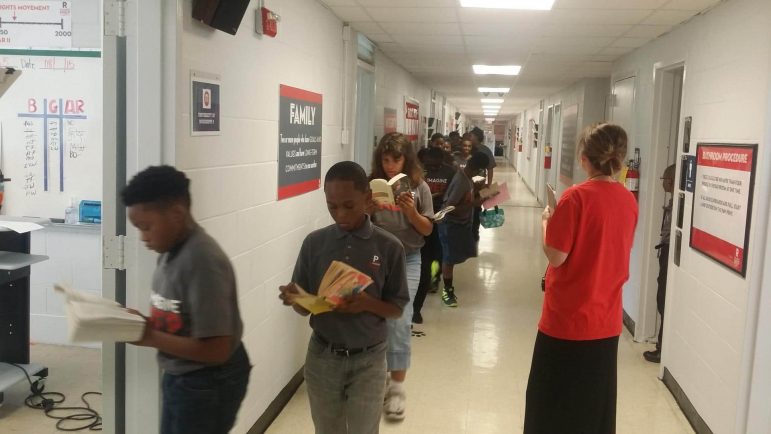States across the U-S have increasingly been turning to charter schools in an effort to bolster struggling public school systems. Two of the most recent states to adopt the controversial form of education are Mississippi and Alabama. As part of a Southern Education Desk series examining charter schools in the South, we turn to Mississippi Public Broadcasting‘s Paul Boger for a report on how those states are adopting to the alternative form of public education.
PAUL: It’s 7:30 in the morning and students at Midtown Charter School in Jackson are sitting in rows, cross-legged on the floor, eagerly awaiting their turn to get breakfast.
NAT SOUND: CLASSICAL
Classical music plays in the background as teachers remind students to use their manners when they get their food.
NAT SOUND: MANNERS
After breakfast, students are led through a recitation of the school’s creed as part of a morning reflection.
NAT SOUND: CREED
It doesn’t take long to realize that there’s something a little different about this school.
Adam Mangana is Midtown’s top administrator.
He says the aim of his charter school is to do things a little different from traditional public schools.
MANGANA: Charter schools have the flexibility to meet the students needs under the guidance of a private board rather than a school board. So a little bit more flexibility. We want to be the very best middle school we can be. We want to provide great instruction and we want to be able to deliver a 21st century education that is enriched with STEM and technology.
PAUL: Midtown is only the second charter in the state to open since legislators allowed their creation in 2013.
The law’s adoption was hailed as a victory by school choice advocates, but the process of opening the schools has been slow going.
Jackson attorney, Tommie Cardin, is with the state board that oversees the authorization of new charters in Mississippi.
He says it took time to find what qualities a new charter school were going to need to be successful.
CARDIN: We want the highest quality, highest performing charters possible, and we’re going to proceed at the pace that will facilitate those types of schools opening. So we’ve drawn from a variety of states, best practices in their experiences.”
PAUL: Alabama also began the process of determining how to establish charter schools earlier this year, when it became the 43 state to adopt the educational alternative.
Del Marsh, is President Pro Tem of the Alabama Senate.
He says there’s an advantage to being one of the last states to adopt the schools.
MARSH: The nice thing about being this late to the table is we have the chance to see exactly what’s worked in these other states and what has not worked. We’re not going to put up with charters that aren’t getting the job done. Those that are successful will be rewarded by staying in business. Those that aren’t we’ll shut them down.
PAUL: Many opponents of charter schools are not convinced by the promise of educational reform.
Ella Bell is a member of the Alabama Board of Education.
Speaking at a recent meeting she says Alabama has not done enough to financially back the state’s traditional public schools.
BELL: I consider that the move toward charter schools has one definitive purpose, and that is to give the state an excuse for continuing to lag behind the quality of education and excellence for our children, because I don’t think we have made the effort to make all of our schools great by doing the right thing.
PAUL: Bell’s opinion has also been echoed by many opponents of charter schools in Mississippi, but despite the criticism, lawmakers seem to be making no effort to repeal the law in either state.
Mississippi’s charters are also already receiving high praise from parents who’ve enrolled their children into the programs.
Media Barber of Jackson says she’s noticed a difference in her children in just a few weeks.
BARBER: I noticed different writing style, which is more college style. Instead of just one word, they are now making complete sentences with everything they do. That’s a requirement and I think that’s absolutely wonderful.
PAUL: And plans are already underway to expand the use of charters in the state.
Ravi Gupta is the CEO of Republic Charter Schools, a Tennessee-based organization that recently opened Reimagine Prep, Mississippi’s other charter.
GUPTA: Republic’s plan is to be here to stay and to continue to serve more and more students who deserve college prep, 21st century education. So, we have Reimagine Prep right now, and we just applied for two new schools and defended those applications in front of the state.
PAUL: So far, no official in Mississippi or Alabama has announced when a new charter school will open in either state, but it’s safe to say it’s only a matter of time.
For the Southern Education Desk, I’m Paul Boger, MPB News.
This report was made possible through a grant from the Corporation for Public Broadcasting. To listen to all four parts of this series, go to www.Southerneducationdesk.org.

